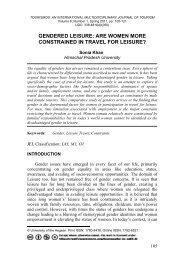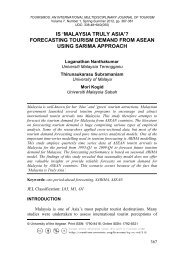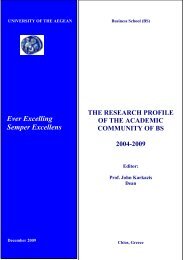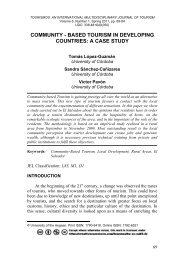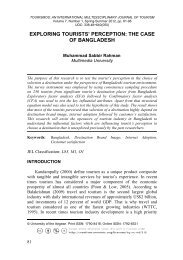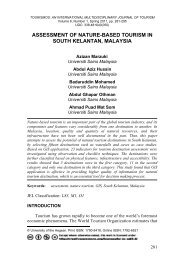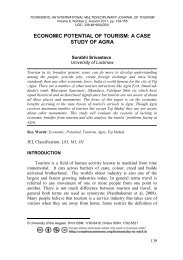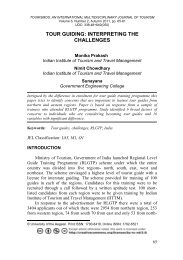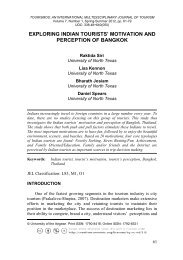TOURISMOS is an international, multi-disciplinary, refereed (peer ...
TOURISMOS is an international, multi-disciplinary, refereed (peer ...
TOURISMOS is an international, multi-disciplinary, refereed (peer ...
Create successful ePaper yourself
Turn your PDF publications into a flip-book with our unique Google optimized e-Paper software.
<strong>TOURISMOS</strong>: AN INTERNATIONAL MULTIDISCIPLINARY JOURNAL OF TOURISM<br />
Volume 6, Number 1, Spring 2011, pp. 233-249<br />
UDC: 338.48+640(050)<br />
participating in environmental improvement <strong>an</strong>d protection, 4) skills for<br />
identifying <strong>an</strong>d solving environmental problems <strong>an</strong>d/or <strong>is</strong>sues <strong>an</strong>d 5)<br />
active involvement at all levels in working toward resolution of<br />
environmental problems <strong>an</strong>d or <strong>is</strong>sues (Hungerford <strong>an</strong>d Volk, 1990).<br />
EE has mainly been establ<strong>is</strong>hed in the formal education; however, its<br />
import<strong>an</strong>ce has been recognized in the forms of non-formal <strong>an</strong>d informal<br />
education. Formal, non-formal <strong>an</strong>d informal EE programs’ objectives<br />
actual<strong>is</strong>ation depends on the environmental educator, the person who <strong>is</strong><br />
responsible for the implementation of the educational process. Informal<br />
EE includes <strong>an</strong>y d<strong>is</strong>semination of information <strong>an</strong>d knowledge, through<br />
mass media, libraries, social contacts or the internet (Tsampoukou-<br />
Sk<strong>an</strong>av<strong>is</strong>, 2004b).<br />
UNEP (1995) in a report on tour<strong>is</strong>m <strong>an</strong>d the environment underlines<br />
the need for programs of guid<strong>an</strong>ce <strong>an</strong>d education regarding ecotour<strong>is</strong>m,<br />
the type of tour<strong>is</strong>m that <strong>is</strong> most representative in a “friendlier” relation<br />
with the environment (built <strong>an</strong>d natural) <strong>an</strong>d all the alternative forms of<br />
tour<strong>is</strong>m (agro-tour<strong>is</strong>m, tour<strong>is</strong>m of adventure, tour<strong>is</strong>m in the nature etc.)<br />
(Ceballos - Lascurain, 1996). It stresses the necessity for information <strong>an</strong>d<br />
education of both the v<strong>is</strong>itors <strong>an</strong>d the residents working in the ecotour<strong>is</strong>m<br />
sites <strong>an</strong>d local enterpr<strong>is</strong>es, <strong>an</strong>d in general for everyone who <strong>is</strong> related with<br />
th<strong>is</strong> sensitive <strong>is</strong>sue. It also stresses the need for org<strong>an</strong>ized action in order<br />
to avoid negative effects in the local culture <strong>an</strong>d environment (UNEP,<br />
1995).<br />
EE <strong>is</strong> particularly import<strong>an</strong>t as it c<strong>an</strong> educate <strong>an</strong>d increase<br />
environmental awareness of local populations, as these are mainly<br />
occupied with ecotour<strong>is</strong>m (Ross <strong>an</strong>d Wall, 1999) but also educate the<br />
tour<strong>is</strong>ts-v<strong>is</strong>itors in the ecotour<strong>is</strong>tic areas as well. Also, there <strong>is</strong> a need for<br />
individuals that provide environmental education in the protected areas<br />
<strong>an</strong>d in the regions of particular natural beauty that also constitute tour<strong>is</strong>t<br />
destinations. Their role <strong>is</strong> closely related to the environmental <strong>an</strong>d natural<br />
education (Sk<strong>an</strong>av<strong>is</strong> et al., 2004). In the protected areas of Europe,<br />
education <strong>is</strong> considered as the most import<strong>an</strong>t subject following<br />
conservation. Their aim <strong>is</strong> to stimulate the conscience of v<strong>is</strong>itors for<br />
nature <strong>an</strong>d to increase their comprehension for values of the natural<br />
environment (Bibelriether, 1999). Pl<strong>an</strong>ners <strong>an</strong>d admin<strong>is</strong>trators of national<br />
parks <strong>an</strong>d other protected areas face increasing challenges in m<strong>an</strong>aging<br />
the popularity of these natural areas as tour<strong>is</strong>m destinations while<br />
ensuring their ecological integrity. Public <strong>an</strong>d private involvement in<br />
tour<strong>is</strong>m <strong>an</strong>d environmental dec<strong>is</strong>ion making facilitates environmental <strong>an</strong>d<br />
tour<strong>is</strong>m pl<strong>an</strong>ning which <strong>is</strong> often a contested political activity involving<br />
<strong>multi</strong>ple, interdependent stakeholders with diverse <strong>an</strong>d possibly divergent<br />
241



